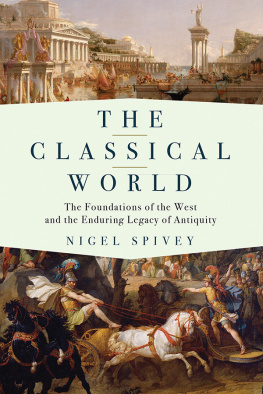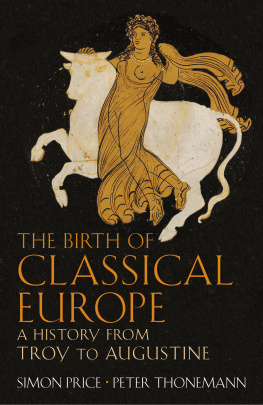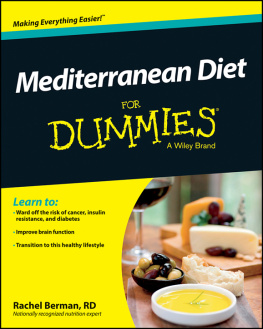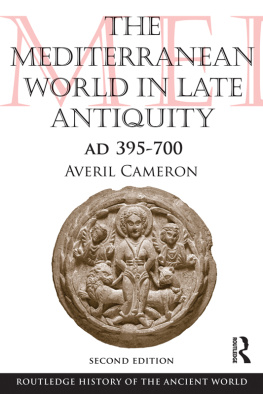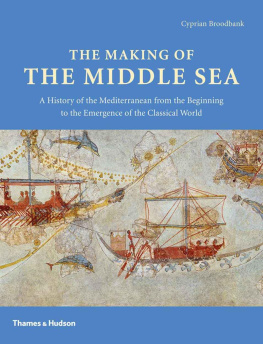MEDITERRANEAN PARADIGMS AND CLASSICAL ANTIQUITY
In this book Mediterranean paradigms are applied to the world of Classical Antiquity, from ancient Greece to the Roman Empire, offering original perspectives with wide-ranging implications to how we view history in general.
In a world that is undergoing processes of globalization, regions rather than national units are becoming important and relevant frames of reference. In recent years the regional concept of the Mediterranean has emerged both as a program for cultural networking as well as a conceptual tool for interpreting society and history. In this book, prominent historians apply Mediterranean paradigms to Classical Mediterranean Antiquity (Greece and Rome), allowing for a new approach to the ancient world and enhancing antiquity's relevance to the understanding of other historical periods as well as our contemporary world.
This book is a special issue of the Journal Mediterranean Historical Review.
Irad Malkin is Maxwell Cummings Family Chair for the Study of Mediterranean History and Culture and Professor of Ancient Greek History at Tel Aviv University. He is the author of Religion and Colonization in Ancient Greece (1987), Myth and Territory in the Spartan Mediterranean (1994), and The Returns of Odysseus: Colonization and Ethnicity (1998) and the editor of several books on issues of Mediterranean history and ancient ethnicity.
MEDITERRANEAN PARADIGMS AND CLASSICAL ANTIQUITY
Edited by
Irad Malkin
First published 2005 by Routledge
2 Park Square, Milton Park, Abingdon, Oxon, OX14 4RN
Simultaneously published in the USA and Canada
by Routledge
270 Madison Ave, New York NY 10016
Routledge is an imprint of the Taylor & Francis Group
Transferred to Digital Printing 2009
2005 Edited by Malkin Irad
Typeset in Times 10/12pt in Europe by Alden Group, Oxford
All rights reserved. No part of this book may be reprinted or reproduced or utilised in any form or by any electronic, mechanical, or other means, now known or hereafter invented, including photocopying and recording, or in any information storage or retrieval system, without permission in writing from the publishers.
British Library Cataloguing in Publication Data
A catalogue record for this book is available from the British Library
Library of Congress Cataloging in Publication Data
ISBN10: 0-415-35635-0 (hbk)
ISBN10: 0-415-56834-X (pbk)
ISBN13: 978-0-415-35635-0 (hbk)
ISBN13: 978-0-415-56834-0 (pbk)
CONTENTS
IRAD MALKIN
NICHOLAS PURCELL
IAN MORRIS
IRAD MALKIN
LIN FOXHALL
BRENT D. SHAW
GREG WOOLF
IRAD MALKIN
Interest in the Mediterranean, both as a heuristic concept and as an area of cultural and economic investment, seems to be growing. One expression of this interest is the Mediterranean programmes of the Euro-Mediterranean partnership and the promotion of multinational and multicultural Mediterranean frameworks as alternatives to binary conflicts. This Barcelona Process has been accompanied by the appearance of new Mediterranean centres and institutions, especially in southern Europe, North Africa, and the Middle East.
There is also growing interest in the history of the use intellectuals have made of the Mediterranean option, representing a cultural agenda for societies and their orientation abroad. For example, Albert Camus is being read again as a prophet of secular Mediterranean humanism. While still living in Algeria he published in 1937 a Mediterranean manifesto and even a poem.
As a region, the Mediterranean fits the new era of globalization and supranational frameworks. Globalization is characterized by the creation of overarching economic and political structures such as the European Union that, perhaps paradoxically, have contributed to the rise of regionalism and localism. This regionalism both influences lived experience and offers a framework for observation and study. In the new Europe there has been a significant rise in regional awareness, probably because the nation-state has diminished as a focus for collective identity. France and Spain are making room for Brittany and Catalonia. There are also regional realignments of different sorts and awareness of affinities, for example, among Bavarian-Tyrolean speakers, French and Swiss-French speakers, and Padanians in Italy. Such realignments stress affinities of dialect, environment, and lifestyle as perhaps more significant than their discrete identities as Austrians, The Mediterranean too is now seen as a region, and accepting regional Mediterranean commonalities may provide the means to acknowledge common legacies that transcend national culture.
As a heuristic concept, especially since Fernand Braudel and his emphasis on the Mediterranean as exchange, Mediterranean paradigms have become particularly appropriate for a time when the validity of traditional historical and national frameworks is being questioned and categories of centre and periphery are being set aside in favour of reciprocal and dynamic networks. This is made clear also in postcolonial studies, where alternative, subaltern or nonhierarchical points of view are being promoted. Involving patterns that transcend national frameworks and structures that question conventional periodization and promote emphasis on networks of exchange, the Mediterranean provides a multilevel prism through which to view history.
The Mediterranean is a concept particularly apt for the discourse of globalization because it mediates between the local, the regional, and the global. Whether it was globalization that ushered in postmodern thinking or the other way around may be debated ad infinitum. What is clear is that it encourages a network approach to economy, if not to society, and that postmodern thinking similarly tends to reject conventional hierarchies and to see events not positivistically but as relative and narrative-dependent. Within this mind-set Mediterranean paradigms become attractive because of their exchange systems, their decentralized points of observation, and their fluctuating categories, in which subjects and objects keep changing places and roles. Mediterranean paradigms also call into question hierarchies of time, especially the origins approach according to which beginnings provide the meaning for what follows.
In sum, we see a convergence of reasons for a revival of interest in Mediterranean paradigms: lived experience and historical continuities; new prisms for historiographical research and historiosophical paradigms of structures and connectivity; a changing Zeitgeist of economy and cultural politics; a globalized world and a new framework of postmodern and postcolonial observation; and a contemporary Mediterranean agenda for Europe and the Middle East. As citizens of the present, the contributors to this volume engage in dialogue with the past while testing the applicability of Mediterranean paradigms to antiquity.
What are Mediterranean paradigms? In 1986 a group of young historians from the School of History at Tel Aviv University established a journal, the Mediterranean Historical Review, of which this volume is a special issue. At the time, historians writing in the West tended to identify historical issues concerning the Mediterranean with the French Annales school and one of its most influential leaders, Fernand Braudel. His seminal


